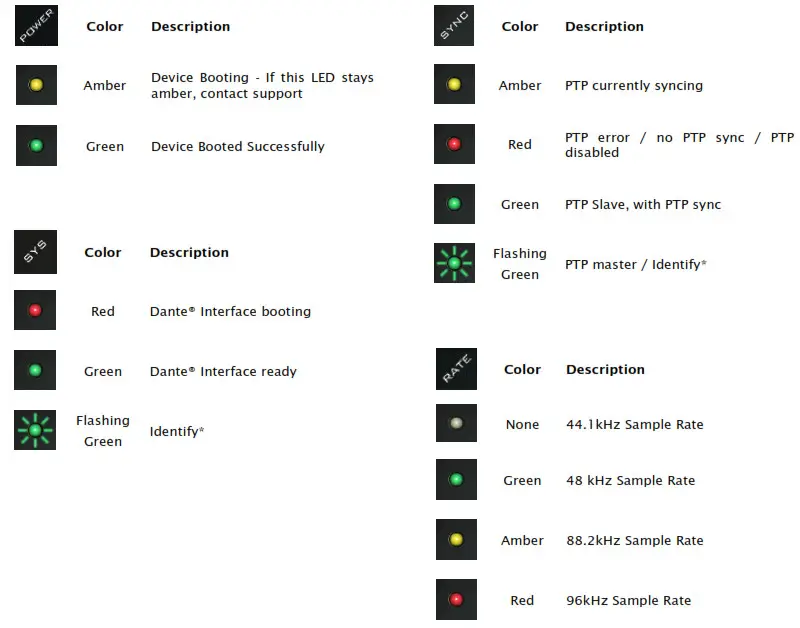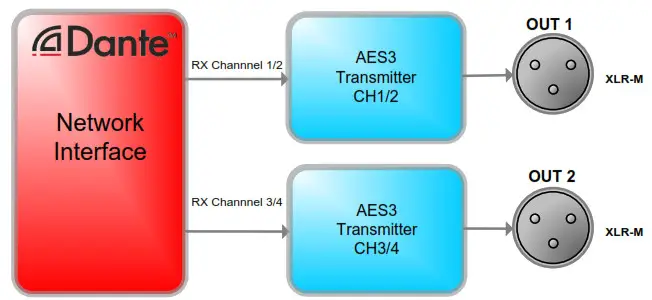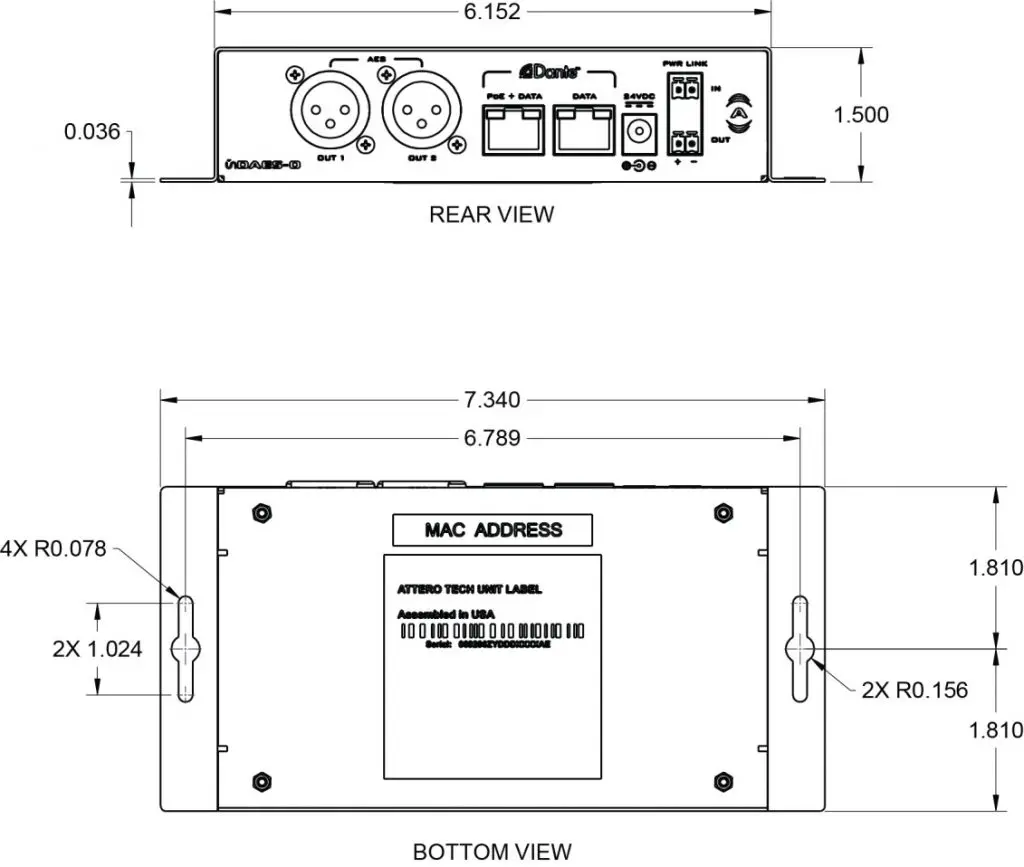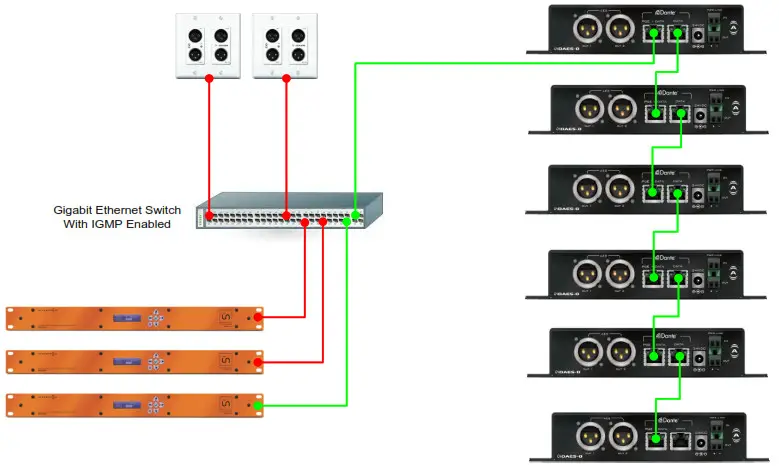

unDAES-O
4-Channel Dante to AES/EBU Interface

User Manual
Date 03/14/2018
Revision 02_b
IMPORTANT SAFETY INSTRUCTIONS
The symbols below are internationally accepted symbols that warn of potential hazards with electrical products.
 This symbol, wherever it appears, alerts you to the presence of uninsulated dangerous voltage inside the enclosure — voltage that may be sufficient to constitute a risk of shock.
This symbol, wherever it appears, alerts you to the presence of uninsulated dangerous voltage inside the enclosure — voltage that may be sufficient to constitute a risk of shock.
 This symbol, wherever it appears, alerts you to important operating and maintenance instructions in the accompanying literature. Please read the manual.
This symbol, wherever it appears, alerts you to important operating and maintenance instructions in the accompanying literature. Please read the manual.
- Read these instructions.
- Keep these instructions.
- Heed all warnings.
- Follow all instructions.
- Do not use this apparatus near water.
- Clean only with a dry cloth.
- Do not block any ventilation openings. Install in accordance with the manufacturer’s instructions.
- Do not install near any heat sources such as radiators, heat registers, stoves, or other apparatus (including amplifiers) that produce heat.
- Protect the power cord from being walked on or pinched particularly at plugs, convenience receptacles, and the point where they exit from the apparatus.
- Only use attachments/accessories specified by Attero Tech
- Use only with the stand, tripod, bracket, or table specified by the manufacturer, or sold with the apparatus.
- Unplug this apparatus during lightning storms or when unused for long periods of time.
- Refer all servicing to qualified service personnel. Servicing is required when the apparatus has been damaged in any way, such as liquid has been spilled or objects have fallen into the apparatus, the apparatus has been exposed to rain or moisture, does not operate normally, or has been dropped.
- If rack mounting, provide adequate ventilation. Equipment may be located above or below this apparatus but some equipment (like large power amplifiers) may cause an unacceptable amount of hum of may generate too much heat and degrade the performance of this apparatus,
 TO REDUCE THE RISK OF FIRE OR ELECTRIC SHOCK, DO NOT EXPOSE THIS APPARATUS TO RAIN OR MOISTURE.
TO REDUCE THE RISK OF FIRE OR ELECTRIC SHOCK, DO NOT EXPOSE THIS APPARATUS TO RAIN OR MOISTURE.
LIMITED FIVE YEAR WARRANTY
The equipment is warranted for five years from the date of purchase from Attero Tech, LLC against defects in materials or workmanship. This warranty does not cover equipment that has been abused or damaged by careless handling or shipping. This warranty does not apply to used or demonstrator equipment. Should any defect develop, Attero Tech, LLC will, at our option, repair or replace any defective parts without charge for either parts or labor. If Attero Tech, LLC cannot correct the defect in the equipment, it will be replaced at no charge with a similar new item. Attero Tech, LLC will pay for the cost of returning your equipment to you. This warranty applies only to items returned to Attero Tech, LLC, shipping costs prepaid, within five years from the date of purchase. This Limited Warranty is governed by the laws of the State of Indiana. It states the entire liability of Attero Tech, LLC and the entire remedy of the purchaser for any breach of warranty as outlined above. NEITHER ATTERO TECH, LLC NOR ANYONE INVOLVED IN THE PRODUCTION OR DELIVERY OF THE EQUIPMENT SHALL BE LIABLE FOR ANY INDIRECT, SPECIAL, PUNITIVE, CONSEQUENTIAL, OR INCIDENTAL DAMAGES ARISIN OUT OF THE USE OR INABILITY TO USE THIS EQUIPMENT EVEN IF ATTERO TECH, LLC HAS BEEN ADVISED OF THE POSSIBILITY OF SUCH DAMAGES. IN NO EVENT SHALL THE LIABILITY OF ATTERO TECH, LLC EXCEED THE PURCHASE PRICE OF ANY DEFECTIVE EQUIPMENT.
This warranty gives you specific legal rights. You may have additional legal rights which vary from state to state.

![]() Note: This equipment has been tested and found to comply with the limits for a Class A digital device, pursuant to Part 15 of the FCC Rules and EN55022. These limits are designed to provide reasonable protection against harmful interference when the equipment is operated in a commercial environment. This equipment generates, uses, and can radiate radio frequency energy and, if not installed and used in accordance with the instruction manual, may cause harmful interference to radio communications.
Note: This equipment has been tested and found to comply with the limits for a Class A digital device, pursuant to Part 15 of the FCC Rules and EN55022. These limits are designed to provide reasonable protection against harmful interference when the equipment is operated in a commercial environment. This equipment generates, uses, and can radiate radio frequency energy and, if not installed and used in accordance with the instruction manual, may cause harmful interference to radio communications.
Operation of this equipment in a residential area is likely to cause harmful interference, in which case the user will be required to correct the interference at their own expense
Overview
The unDAES-O is a small, cost-effective Dante to AES3 interface that bridges Dante networked audio, directly to AES3 enabled digital audio equipment, keeping the audio signals in the digital domain in the process. The unDAES-O receives up to four (4) audio channels from the Dante network and outputs these on two (2) AES3 outputs using XLR connectors The small flange-mount form factor and scalability of the unDAES-O solution makes it a great tool for interfacing legacy digital audio equipment such as power amplifiers, mixing consoles, signal processing gear and broadcast equipment to Dante networks with ease.

Figure 1 – unDAES-O Front and Rear Panel Views
In addition to the AES3 output connectors, the unDAES-O features two Ethernet connections available on RJ-45s. When viewed from the rear panel, the left-most RJ-45 connector can use to receive 802.3af-compliant PoE power from a PoE power sourcing device such as an Ethernet switch or mid-span PoE injector. The unDAES-O also features an internal Gigabit Ethernet switch allowing for daisy-chain applications to flexibly scale the number of AES3 outputs available from a single home-run back to the Dante Ethernet switch infrastructure.
Alternatively, the unDAES-O can be powered from an external +24VDC via the barrel jack input or from the PWR LINK Phoenix-style input connector. The PWR LINK feature is intended to be used with other Attero Tech devices supporting the PWR LINK connections to supply power between daisy-chained devices.
The following diagram shows the signal flow and channel assignment for the AES-3 outputs.

Figure 2 – Signal Flow Diagram
What’s in the Box
The unDAES-O comes supplied with the following:
unDAES-O device
(2) PWR LINK Phoenix Connectors
Optional Extras
All of the following are available as options for the updates-O that may be ordered separately:
A 24 V DC power supply is available if PoE or PWR LINK power is not required or available
Device Installation

| 1. | Recessed factory reset switch |
| 2. | Power LED |
| 3. | Dante® status LEDs |
| 4. | Sample rate indicator LED |
| 5. | AES3 output connectors (XLR) |
| 6. | Dante’ + PoE Ethernet connection |
| 7. | Dante’ Ethernet connection* |
| 8. | DC barrel jack power input (+24VDC) |
| 9. | Power Link I/O – Top = PWR LINK IN (+24VDC), Bottom = PWR LINK OUT (+24VDC) |
*Note: The updates-O has a label on one of the mounting flanges that shows the device’s MAC address. This is important for initial device identification as the last six digits make up part of the device’s default network name that is shown when the device is detected by Dante Controller. The full MAC address is also given at the bottom of the unit.
Mounting
It is recommended that the unit be secured to a flat surface with a screw through each mounting flange. Dimensions for mounting are shown in Figure 3 below. Use a No. 6 screw of a type and length that is applicable to the surface to which the unDAES-O will be attached. Alternatively, if rack-mounting is desired, industrial strength hook and loop
fasteners (Velcro®) work well for securing the updates-O to a standard 1-RU rack shelf. The width of the unit allows for two updates-0 devices to be installed next to each other on a standard 1-RU rack shelf.

Figure 3 – Mounting Information
*Note: All Attero Tech products are tested using UTP cabling and it is recommended that UTP cabling be used when installing them. STP cabling can be used for installation though care must be taken not to introduce grounding issues into the system by doing so.
When powering using PoE:
- Attach the Dante/PoE port to a spare PoE-enabled port on a PoE switch using a CAT-5 cable. If a mid-span injector is being used, connect a spare input port to the Dante network switch using a CAT-5 cable, and then connect the corresponding output port to the Dante I/F of the unDAES-0.
When powering using an optional external supply:
- Attach the Dante/PoE port to a spare port on the Dante network switch using a CAT-5 cable.
- Attach the power supply to the power input jack and then power up the external supply.
When powering using a Power Link connection from another Attero Tech device:
- Power down the device that will be sourcing power to the unDAES-O.
- Attach a cable to the PWR LINK output of the source device.
- Attach the other end of that cable to the PWR LINK input on the unDAES-O.
- ower up the source device, which in turn will power the unDAES-O.
If powered correctly, the power LED on the front should be lit.
Status LEDs
The front panel LED’s show the Dante diagnostic status. If network or audio problems persist, these LEDs may assist in identifying issues.
The LED’s are POWER, SYS, SYNC and RATE and the color of each LED has different meanings. The tables below show the combination and what each combination means.
 *Note: The Identify function is indicated by both the SYS and SYNC LEDs flashing green simultaneously. This function is initiated by the user issuing an Identify command using Dante Controller.
*Note: The Identify function is indicated by both the SYS and SYNC LEDs flashing green simultaneously. This function is initiated by the user issuing an Identify command using Dante Controller.
Daisy Chaining and Power Linking
A unique feature of the unDAES-O is its support of daisy-chaining. This allows an unDAES-O unit to connect to other Attero Tech devices that support daisy-chain support and utilize a single home run of Ethernet cabling back to the switch thus saving on installation costs. Daisy-chaining simply requires the unDAES-O to be connected to the spare Ethernet port of the last unDAES-O (or other device supporting Dante daisy-chaining) in the current chain. Not only can the Ethernet connection be daisy-chained, power can also be daisy-chained too by connecting the power link output on the powered device to the power link input on the next device in the chain. This works even if the initial device in the chain is powered by PoE.
Due to the use of an internal Gigabit Ethernet switch, the number of supported switch hops/daisy-chained devices is quite high. The actual number of supported switch hops depends on the expected latency settings that are intended for the devices on the network. Practically speaking, ten daisy-chained unDAES-O devices or less will support the minimum latency settings that can be applied to the unDAES-0. Beyond that, the number of switch hops may cause audio problems due to excessive latency and increased clock jitter. The other limitation is the power supply if power is also being daisy-chained from device to device:
o PoE -If power is supplied to the first device via PoE, the daisy chain limit is restricted to the initial device plus three (3) others (trying to do more will cause the POE to over current at the power sourcing equipment).
o Local DC – If power is supplied to the first device via a local DC supply, the supply’s maximum power output determines the number of devices it can support (assume 3W @ 24V DC per device).
To daisy chain, an unDAES-O to another unDAES-O device, connect an Ethernet cable from the data-only port of the unDAESO to the Ethernet port of the unDAES-O to supply the network information. To chain the power, connect the “PWR LINK OUT” connector of the unDAES-O to the “PWR LINK IN” connector on the daisy-chained unDAES-O. Additionally, if there are a significant number multicast audio flows configured on the Dante network, it is recommended that the core network switches that interface to the daisy-chained network segments be configured with the appropriate IGMP settings to shield the daisy-chain from unnecessary multicast audio traffic. The example shown in figure 4 highlights how an IGMP enabled switch can to eliminate unnecessary multicast audio traffic from the unDAES-Odaisy chain segment. The red connections show devices that are configured for multicast audio flows and the green are unicast flows and each show the network segments that are traversed by the associated audio traffic.
 Figure 4 – Network Configuration Example
Figure 4 – Network Configuration Example
Device Configuration
The unDAES-O has no configurable parameters beyond the native Dante configuration parameters. The only setup required is to configure the routing of the audio over the Dante network. This must be done over the Dante network.
The audio routing should be carried out using any application that supports Dante audio routing. This could be from a 3rd party manufacturer or Audinate’s Dante Controller application. Dante Controller can be obtained from the Audinate website (www.Audinate.com). Instructions on how to use this software and about setting up routes on a Dante network can also be found on Audinate’s website.
*Note: When using Dante controller, the unDAES-O will be shown using a default device name of unDAES-O -###### where ‘######’ is the last six characters of the devices MAC address.
IP Address Setup
IMPORTANT
While the unDAES-O will be detected, failure to configure compatible IP addresses on either the PC or the device will cause the input and output channels not to be visible in Dante Controller and routing of audio to and from the unDAES-O will not be possible.
Note: The following assumes that routing is being set up using Dante Controller running on a PC or Mac. However, it also applies to any device that is running an application capable of setting up Dante routes.
In order to configure an unDAES-O to set up audio routing, the PC will need to be able to communicate with it over the network. While all Dante devices will be discovered regardless of the IP address of the PC and the individual devices, routing setup can only occur if the PC and each device have compatible IP addresses.
By default, unDAES-O is set to get a dynamic IP address. As with all Dante devices, if the unDAES-O device does not find a DHCP server to retrieve an IP address from, it will give itself a link-local IP address also known as an automatic private IP address (APIPA) instead. A link-local IP address is always in the range 169.254.x.y.
To ensure initial communication, the PC/Mac can either be set to get a dynamic IP address or be given a static IP address in the range 169.254.x.y. The PC may require a restart for any network configuration changes to take effect.
Once communication has been established, the unDAES-O IP address can then be configured, if required, to match the requirements of the application.
Further information on IP setup for an audio system using Dante can be found in the FAQ’s on the Audinate website (https://www.audinate.com/resources/faqs).
Factory Reset
Should it be necessary, the unDAES-O has a factory reset option. All Dante settings are reset including device name and channel names, the Ethernet port mode will be defaulted back to redundant mode and the IP address setup will be reset to get an IP address dynamically.
The factory reset switch is accessed through a small hole on the front panel. The active factory reset insert a paperclip or small screwdriver into the factory reset hole and press and hold the factory switch for five seconds then releasing it. Changes to the LED’s on the front panel will indicate the factory reset was successful.
ARCHITECTS and ENGINEERS SPECIFICATION
The Dante to AES3 Interface shall provide 4 channels of Dante networked audio converted to the AES3 digital audio output format. The unit shall provide a Power/ID LED, a Sys, LED, a Sync LED and a Rate LED on the front panel to indicate system status. The unit shall two XLR connectors on the rear panel for connection to AES3 capable digital audio equipment. A rear-panel Date interface shall receive power over the Ethernet cable from an IEEE 802.af PoE compliant switch or midspan injector, a +24VDC power supply, or another Power Link capable device. The device shall support Dante audio network connectivity via two Ethernet connections available on two RJ-45 connectors. The Ethernet connections shall support daisy-chaining of Dante and Ethernet data.
The unit shall support 4 digital audio output channels at 44.1kHz, 48kHz, 88.2 kHz and 96 kHz sample rates, with 24bit audio samples.
The unit shall support AES3 digital audio output and indicate professional mode, bit depth and sample rate within theAES3 status bit fields. The Dante to AES3 Interfaceshall be compliant with theRoHS directive. The Dante interface unit shall be compliant with the EMI/EMC requirements
+FCC andCE. Warranty shall be 2years.
Device Specifications
| AES3 (IEC 60958) | |
| Connector(s) | Two (2) 3-Pin XLR Male |
| AES3 Status Format | Professional |
| Audio Performance: | |
| Audio Channels | Four Dante network audio channels to AES3 digital Outputs |
| Sample Rates | 44.1 kHz 48 kHz 88.2kHz 96kHz |
| Bit Depth: | 24-bit |
| THD: | < 0.001% |
| Dante Network | |
| Physical Level: | Ethernet |
| Connector: | Single RJ-45 |
| Cable Quality: | CAT-5e or better |
| Transmission Speed: | 1Gbps |
| Power Requirements | Class 0 802.3af PoE PD compliant |
| Power Consumption | < 3 W |
| Dimensions | 6.45″ W x 1.06″ H x 3.45″ D |
| Weight | -,. 0.74 lbs |
| Compliance | FCC Part 15 Class A CE (EN 55022 Class A) |
Document Information
| Document title: | unDAES-O |
| Document file name: | unDAES-O User Manual.docx |
| Revision number: | <02_a> |
| Issued by: | Attero Tech |
| Issue Date: | 10/16/2017 |
| Status: | Released |
Revision History
| Revision | Date | Author | Description of change |
| 00_a | 04/01/15 | JDA | Initial Draft |
| 00_b | 04/17/15 | JDA | Rolling in review comments. |
| 00_c | 04/22/15 | CNL | Minor corrections and formatting changes. Conversion to DOCX format |
| 01 | 04/22/15 | CNL | Release Version 01 |
| O1 _a | 08/18/15 | JDA | Added in content for 4 channel support in 88.2kHz and 96kHz modes |
| Ol_b | 9/15/15 | JDA | Revised updated sample rate details. Corrected A&E specs. |
| 02 | 9/15/15 | CNL | Release Version 02 |
| 02_a | 10/16/17 | CNL | Bug #3481 – Update manual regarding UTP/STP cable Added text regarding Factory Reset option |
| 02_b | 03/14/18 | SGG | Warranty Updated |
•Attero Tech LLC 2018